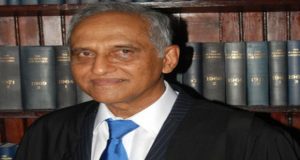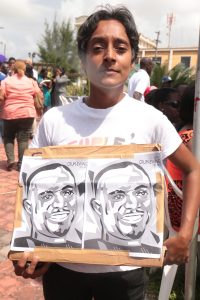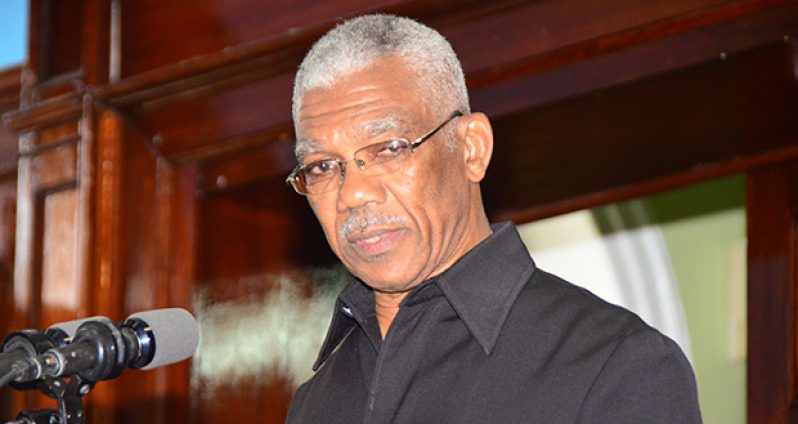“WHY only 11,” social activist Sherlina Nageer asked, as she reacts to President David Granger’s move to pardon 11 women for Christmas.Speaking with the Guyana Chronicle, Nageer lauded the decision by the Head of State, contending that it “needs to be done more often”.

Nageer, who has been at the forefront in the fight for equality and women’s rights, told this publication that in some instances, both men and women are unjustly imprisoned for petty, non-violent crimes, while the “bigger fishes are left to walk free”.
These petty “criminals” she said, especially women, are driven to commit illegal acts, out of economic desperation.
“When they are jailed, their children and families suffer even more and society ends up paying an even bigger price down the line. This is not justice at all,” she contended.
She also contended that the sentencing system needs an overhaul.
“There are no standards; magistrates operate willy-nilly. Also, more needs to be done to prevent folks from ending up under such pressure in the first place,” the social activist pointed out.
And on that note, she said greater attention has to be paid to financially empower women, youth and other vulnerable groups so as to give them an alternative to the crooked path.
The Guyana Bar Association (GBA) did not oppose the decision by President David Granger to free 11 convicted mothers from prison for the holidays, but it expressed uneasy about the procedures followed by the President.
On Friday last, during his weekly interview programme “The Public Interest,” the Head of State announced his intention to pardon 11 mothers who are in prison for minor offences, saying it was “an act of compassion”.
“I don’t see why a 19-year-old should be sentenced to 14 months in prison for stealing a cell phone. I know there are other factors, but I intend to do this every Christmas for young mothers and every Independence Day for young persons,” President Granger said.
This announcement comes some seven months after he had pardoned 60 young persons, also convicted of minor offences. And that announcement was supported by several bodies, including the Guyana Human Rights Association (GHRA).
PROCEDURES
However, the GBA had contended that while it supports the principle of pardon, there could be no unqualified endorsement of the President’s action, unless the procedures which facilitate such arrangements were followed.
“As their convictions would have been a matter of public record, it is reasonable to expect that their pardons should also be made public. While the pardoned persons may very well deserve their release from prison, utilising the presidential pardon in such a mysterious manner and without setting out specific criteria is a dangerous precedent,” the association warned.
Additionally, the body argued that what causes more than a little concern over the pardons by the President was the manner in which it was done.
“As a matter of law, the publication of the names of persons who benefit from a presidential pardon is a necessary corollary to the exercise of such power,” the GBA said.

Following President Granger’s announcement on Friday, the GBA is once again calling for clarification on the procedures employed to determine who would have qualified for this ‘act of compassion’ and whether it should be regarded as a pardon or a commutation of sentence.
According to GBA President Christopher Ram, the body does not oppose this ‘act of compassion by the President’, since he is entitled to do so based on provisions in the Constitution.
Article 188 of the Constitution states, “The President may – (a) grant to any person concerned in or convicted of any offence under the law of Guyana, a pardon, either free or subject to lawful conditions; (b) grant to any person a respite, either indefinite, or for a specified period, of the execution of any punishment imposed on that person for such an offence; (c) substitute a less severe form of punishment for any person for such an offence; or remit the whole or any part of any punishment imposed on any person for such an offence or of any penalty or forfeiture otherwise due to the State on account of such an offence.”
Although there are legal provisions to facilitate such an arrangement to free persons from prison and the President acted within the ambit of the law, Ram observed that there was no clear disclosure as to the procedures employed.
PARDON OR A COMMUTATION
He reasoned that it must be known whether this was a pardon or a commutation of sentence since in the case of the former, the police would be required to remove from the records, the offence(s) which led to the conviction of the person now being freed.
In the case of a commutation, Ram added, the sentence would still be listed in the records despite the person being freed. “If these procedures are not disclosed then the police would not know how to act,” the GBA President said.
He maintained, however, that this move by the Head of State is not one which the association is opposed to, but there must be clarity on the process and procedures.
By Ravin Singh



.jpg)








